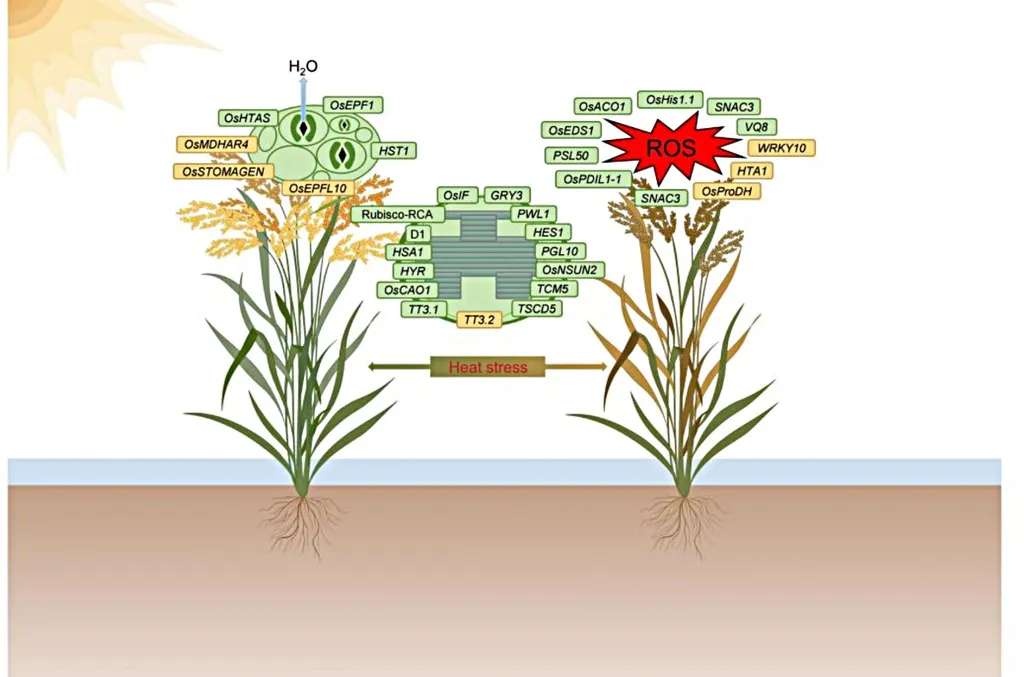In the face of climate change, rice—one of the world’s most vital crops—is under siege from rising temperatures. A recent study published in *Discover Plants* offers a promising breakthrough in the quest to develop heat-tolerant rice varieties, potentially safeguarding global food security. The research, led by Muhammad Kazim Ali from the Department of Applied Sciences at Hamdard University, introduces a novel approach to identifying and breeding rice cultivars that can withstand high temperatures, a critical need as extreme weather events become more frequent.
The study zeroes in on the heat shock protein HSP70, a molecule that plays a pivotal role in protecting plants from thermal stress. By analyzing four rice cultivars under heat stress conditions (40 ± 2°C), the researchers discovered that early and sustained expression of HSP70 is a key indicator of heat tolerance. This finding is not just a scientific curiosity; it has profound implications for agriculture.
“Early induction of HSP70 is like a biological alarm system that prepares the plant for stress,” Ali explains. “Cultivars that activate this response quickly are better equipped to survive and maintain productivity under extreme heat.”
The researchers developed a new metric called the Heat Tolerance Coefficient (HTC), which integrates molecular, physiological, and agronomic data to quantify a plant’s resilience. This coefficient proved to be a powerful tool for assessing heat tolerance, offering a more holistic approach than traditional methods.
The study revealed striking differences between heat-tolerant and heat-sensitive cultivars. Tolerant varieties like K-95 and IR-6 showed robust HSP70 expression, leading to superior membrane stability, minimal oxidative damage, and high spikelet fertility retention. In contrast, sensitive cultivars like DR-92 and DR-83 exhibited delayed HSP70 expression, resulting in severe membrane damage, significant oxidative stress, and a drastic decline in fertility.
The commercial implications of this research are substantial. Rice is a staple food for more than half the world’s population, and any disruption in its production can have far-reaching consequences. By identifying and breeding heat-tolerant varieties, farmers can mitigate the risks posed by climate change, ensuring stable yields and food security.
“This research provides a roadmap for breeding programs to develop climate-resilient rice varieties,” Ali says. “The HTC offers a practical framework that can accelerate the selection process, making it easier to identify the most promising cultivars for further development.”
The study also highlights the importance of oxidative stress management in heat tolerance. By understanding how HSP70 interacts with oxidative damage markers like hydrogen peroxide (H2O2) and malondialdehyde (MDA), researchers can develop targeted strategies to enhance plant resilience.
Looking ahead, this research could shape future developments in the field of agritech. The HTC metric, for instance, could be adapted for other crops, providing a universal tool for assessing heat tolerance. Additionally, the focus on HSP70 opens new avenues for genetic engineering and biotechnology, where scientists could potentially enhance HSP70 expression to create super-resilient crops.
As climate change continues to pose challenges to global agriculture, innovations like these are more important than ever. By leveraging cutting-edge science, researchers are not only safeguarding food security but also paving the way for a more sustainable and resilient future.

